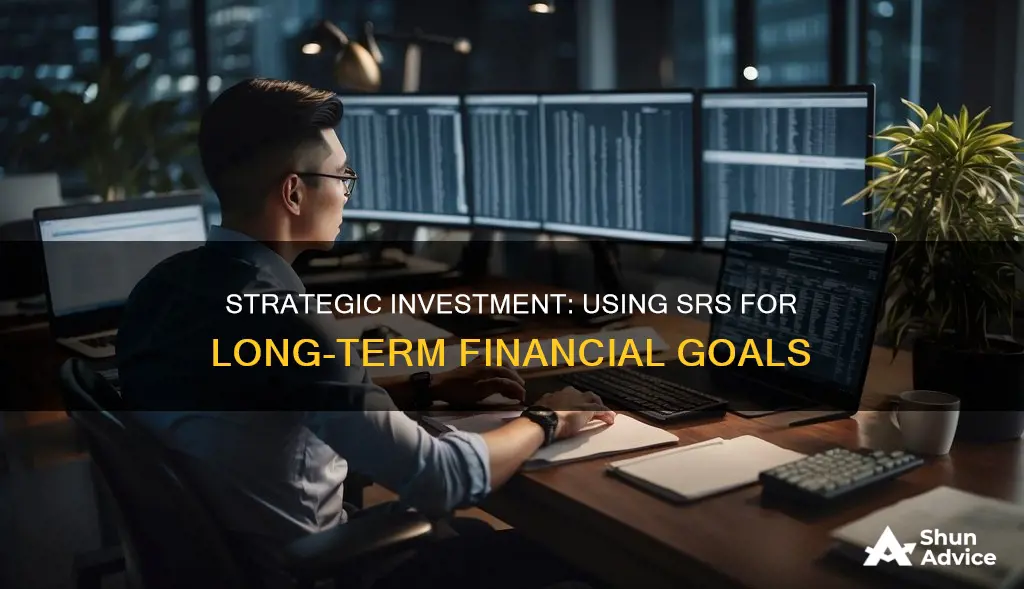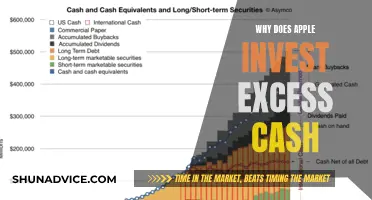
Singapore's Supplementary Retirement Scheme (SRS) is a government-backed initiative to help people save for retirement. The scheme offers attractive tax savings, and it has become a core pillar of Singaporeans' retirement planning. The number of SRS account holders rose by 75% from 2020 to 2022, and contributions increased from S$12.2 billion to S$16.31 billion during the same period.
SRS contributions are eligible for tax relief the following year. For example, if you contribute to your SRS account by 31 December 2023, you can get tax relief in the Year of Assessment 2023 (tax to be paid in 2024). If your taxable income is S$100,000 and you put S$10,000 into your SRS account, you pay tax on S$90,000, not S$100,000.
However, if you leave your SRS funds uninvested, you will only earn about 0.05% per annum, in line with banks' typical savings account interest rates. Therefore, it is important to explore other investment options with your SRS monies, such as Singapore Government Securities, exchange-traded funds (ETFs), stocks, bonds, endowment plans, and fixed deposits.
| Characteristics | Values |
|---|---|
| Annual contribution cap for Singaporeans and PRs | $15,300 |
| Annual contribution cap for foreigners | $35,700 |
| Tax relief on contributions | Dollar-for-dollar |
| Maximum yearly contribution for Singaporeans and PRs | $15,300 |
| Maximum yearly contribution for foreigners | $35,700 |
| Tax on withdrawals before retirement age | 100% |
| Early withdrawal penalty | 5% |
| Tax on withdrawals at retirement age | 50% |
| Tax on dividends from SRS investments | 0% |
| Number of SRS account holders | 387,377 |
| Total contributions to SRS accounts | $16.3 billion |
| Percentage of SRS funds sitting in cash | 21% |
| Interest rate on SRS accounts | 0.05% |
| SRS-approved funds offered by UOBAM | 4 |
What You'll Learn

Endowment Insurance Plans
There are several types of endowment insurance policies:
- Participating Endowment Policies: These policies share in the profits of the company's participating fund, with your share of the profit paid in the form of bonuses or dividends to your policy. Bonuses are not guaranteed and may fluctuate depending on the investment performance of the fund.
- Non-Participating Endowment Policies: These policies have guaranteed maturity values and cash values but do not provide any bonuses.
- Anticipated Endowment Policies: These are similar to regular endowment policies, but a part of the sum assured is paid at pre-specified intervals during the term of the policy. The balance of the sum assured, along with any accrued bonuses, is paid at maturity. These are available as both participating and non-participating policies.
When you purchase an endowment insurance plan, you choose the size of your death benefit and the length of coverage. You also select the amount you want to receive at the end of your policy as the endowment payment. You then pay premiums to keep your coverage active, with part of these premiums going towards insurance coverage and the rest being invested to earn returns.
Transferring Cash Investments: Charles Schwab to Schwab
You may want to see also

Unit Trusts
When you invest in a unit trust, you own units or shares that represent a part of the trust's portfolio holdings. These holdings are typically actively managed by a professional fund manager or a team of managers. The fund manager's role is to ensure that the trust's investments align with its stated investment objectives. For example, some unit trusts focus on generating stable, recurring income, while others aim for capital growth.
Investing in unit trusts offers several benefits:
- Simple and Transparent: You don't need extensive knowledge or expertise to invest in unit trusts. The track record, historical returns, and investment holdings of a unit trust are clearly stated in its fact sheet, making it easier to decide if it aligns with your investment goals.
- High Liquidity: While unit trusts are typically not listed, they offer high liquidity. Investors can usually buy or sell their investments on any business day, and the price is based on the net asset value (NAV) at the end of the trading day.
- Low Initial Investment Amount: The minimum investment amount is typically S$1,000, making unit trusts an affordable way to invest in a well-diversified portfolio.
- Professional Fund Management: Unit trusts are managed by a team of professional portfolio managers who actively manage your investments and provide access to investment information, analysis, and tools.
- Broad Diversification: A single investment in a unit trust provides immediate diversification across multiple companies, regions, business sectors, and even asset classes. This diversification helps balance out the performance of individual companies or industries.
- Assets Held by a Trustee: An independent trustee acts as the custodian of the unit trust's assets, providing a safety net for investors. In the event that the fund management firm ceases operations, the trustee will continue to control and account for the assets.
When investing in unit trusts, it is important to consider your risk tolerance and financial goals, as well as factors like fees and the fund's performance track record.
Cash App Investing: How to Stop and Withdraw
You may want to see also

Stocks or ETFs
If you are looking for a more hands-on approach to investing your Supplementary Retirement Scheme (SRS) funds, you can consider investing in stocks or exchange-traded funds (ETFs).
Stocks
You can use your SRS funds to buy most individual stocks listed on the Singapore Exchange (SGX). However, it is important to note that individual stocks are subject to corporate actions, which can be complicated when investing with SRS funds. For example, if a company issues rights, you may need to top up to prevent your shares from being diluted, but you may not have enough SRS balance or may have reached the yearly contribution limit.
Some brokers, such as Moomoo and Tiger Brokers, offer powerful platforms and competitive fees for stock trading.
ETFs
ETFs are listed on the stock exchange and aim to replicate the performance of a specific stock or commodity index. They are a more passive investment strategy compared to stocks. Some popular ETF options include:
- Straits Times Index (STI) ETF
- Lion Global Infinity Global Stock Index Fund
- Lion Global Infinity U.S. 500 Stock Index Fund
- Lion Global Infinity European Stock Index Fund
- Nikko AM Singapore STI ETF
- ABF Singapore Bond Index Fund
- Lion-OCBC Hang Seng Tech ETF
Things to Consider
When investing in stocks or ETFs with your SRS funds, there are a few things to keep in mind:
- You will need to contact your stockbroker to update your SRS investment bank account details and select the "SRS" option under "trade type" to conduct an SRS stocks trade.
- "Contra" trading is not available for SRS trades.
- Any gains realised on your investments are not subject to income tax before withdrawal.
- Since July 2015, you can withdraw your SRS investments by transferring them out of your SRS account (e.g. into your personal Central Depository (CDP) account) without liquidating them. This is applicable to withdrawals that qualify for the 50% tax concession.
Investing in stocks or ETFs with your SRS funds can be a great way to take advantage of tax benefits and grow your retirement savings. However, it is important to carefully consider your investment options and seek professional advice if needed.
A Beginner's Guide to Investing via Binance
You may want to see also

Singapore Government Securities
SGS Bonds differ from T-bills in their maturity periods and interest payment structures. SGS Bonds have longer maturity periods, ranging from 2 to 50 years, and they pay a fixed coupon every six months. This regular interest payment makes them attractive to investors seeking a steady income stream over a more extended period.
The minimum investment amount for SGS Bonds and Treasury Bills is S$1,000, while for Singapore Savings Bonds, it is S$500. You can purchase Singapore Government Securities using the Supplementary Retirement Scheme (SRS), which offers tax relief and helps you save for retirement.
By investing your SRS funds in SGS, you can benefit from the stable and secure nature of government-backed securities while also diversifying your investment portfolio. The fixed and regular interest payments from SGS Bonds can provide a reliable income stream, especially for those seeking long-term investments.
It is important to note that SRS contributions are voluntary and have maximum yearly contribution limits. For Singapore Citizens and PRs, the limit is S$15,300, while for foreigners, it is S$35,700. Additionally, early withdrawals from SRS accounts before the retirement age may be subject to penalties and taxes.
Understanding Zero Cash Flow Investment Strategies in 1031 Exchanges
You may want to see also

Structured Deposits
OCBC offers a 1.5-year Equity-Linked Structured Deposit with a fixed return of 2.00% and a bonus coupon of 4.00% upon the fulfilment of the bonus conditions.
It is important to note that Structured Deposits are not insured under the Deposit Insurance and Policy Owners' Protection Schemes Act of Singapore.
T. Rowe Price Employee Investment Requirements: What You Need to Know
You may want to see also
Frequently asked questions
The Supplementary Retirement Scheme (SRS) is a voluntary government scheme that helps individuals save for retirement with tax benefits and employer contributions.
You can open an SRS account if you are: a Singaporean, a Permanent Resident, or a foreigner working in Singapore; at least 18 years old; and not an undischarged bankrupt. There are three SRS operators in Singapore: UOB, DBS, and OCBC. You can register for an SRS account with any of them on their online platforms.
The yearly contribution for a Singaporean or Singapore Permanent Resident is capped at S$15,300. If you're a foreigner, you'll be allowed a higher yearly contribution of S$35,700 as you do not enjoy tax relief on your CPF contributions.







